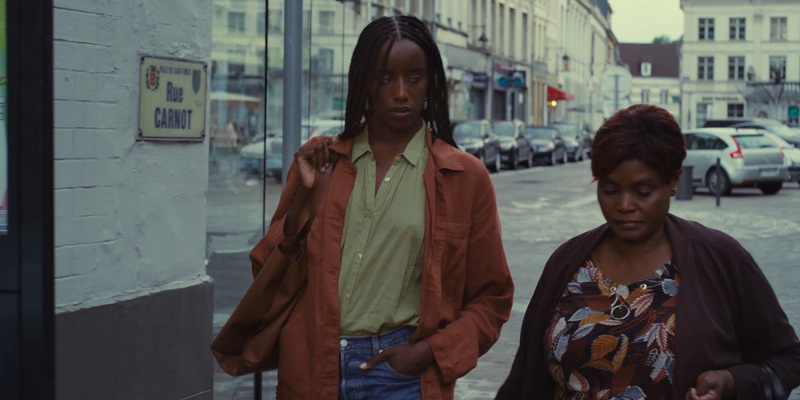
A writer takes a special interest in the trial of a Senegalese-French student accused of killing her infant
daughter.
Review by
Blair MacBride
Directed by: Alice Diop
Starring: Kayije Kagame, Guslagie Malanda, Valérie Dréville, Aurélia Petit, Xavier
Maly

A first foray into feature films for documentary-turned-fictional
director Alice Diop, Saint Omer is an atypical
legal drama.
Based on the 2016 French court case of Fabienne Kabou, the film follows
a pregnant novelist named Rama (Kayije Kagame). Rama travels to a
commune called "Saint Omer" to attend the trial of Laurence Coly (Guslagia Malanda), in an attempt to find inspiration for her new book about the Greek
tragedy of Medea - the tragedy being a rather morbid story of a woman
feeling trapped as an outsider, who later murders her own children as
revenge against her adulterous husband. Returning to the present, the
link to the ancient Greek tale is that Laurence Coly is a Senegalese
immigrant woman who is accused of infanticide. Despite Rama's initial
professional intentions, over the course of the trial, she becomes
personally fraught as similarities between herself and Coly begin to
rear their head.
As Diop's first fictional venture, the film, unsurprisingly, does very
well in shining light on the real challenges which immigrants from
different cultures may face in western society, through the extreme case
and awful experiences of Laurence Coly. Additionally,
Saint Omer's narrative is pretty intriguing with it being delivered in a less
than conventional way. No doubt a trait ingrained in the director from
years of experience, the feature is filmed in a documentarian style. The
minimalist stationary camera shots on each subject matter - whether it
be Rama; Coly in the witness box; the judge in the trial; or the
solicitors of both the prosecution and defence - really build an early
intensity, portraying the legal drama as if one were cross-examining the
witness themselves.

While initially endearing, this style nonetheless later begins to badly
affect the pacing of the film. The once enjoyable documentary style
static shots begin to go on for what feels like countless minutes on
end. Indeed, what appears to be at first a slow burner later turns into
a bit of slog.
At its heart, Saint Omer is filled with many core themes
like race, maternity, immigration, niche cultures, manipulation and
mental health - many of which are commonplace in the work of Diop. From
these themes, it is clear that the director is, quite admirably as ever,
trying to paint the picture of a wider story; a story which transcends
just Rama and Coly on trial. It is the story of general power structures
in France, and the difficulties that those from different cultures,
other than that of traditional western backgrounds, might experience.
To portray this central message, Diop attempts to use Rama as the focal
point of her feature, using the character as our "protagonist": but this
is where the film breaks down. Rama is quite uniquely and bizarrely cast
aside for the majority of screen time, with the legal trial taking
centre stage as Saint Omer's backbone. The film sporadically gives glimpses into short scenes of
Rama's childhood, featuring her troubled relationship with her mother,
in an attempt to both bring the narrative back to the story's main arc
and to highlight the similar plights of Rama and Coly.

These efforts, though, are unfortunately in vain. The contents of the
trial undeniably evoke harrowing memories in Rama, and she is left
disturbed, coping with troubling flashbacks from her own past. What
appears so vivid and so clear to Rama, however, doesn't always
materialise in the same way for the audience. Although we understand
Rama is concerned about becoming a bad mother like Coly because of
Rama's terrible relationship with her own mother, this doesn't land as
well as intended.
Moreover, it is evident that Rama is severely troubled by what is being
brought to light in the legal case, but Diop's wayward direction and
poor character development do Rama's story arc a disservice. Indeed, the
inability to fully convey one of the central intertwined story themes is
disappointing. While there are obvious levels to this plot, the slightly
weak and concise flashback scenes leave the viewer craving something
deeper.

But Saint Omer carries on despite the deflating depiction
of a few core themes - the trial nevertheless remains. The continued
staccato camera shots going from person to person in the court begin to
pick up again, and the film builds towards a crescendo as we await the
outcome of the legalities. Yet again, though, this build feels aimless
as Diop's minimalist methodology leaves us wanting more than we are
actually given.
Although the very nature of exploring complex issues in a relationship
is often quite engrossing, the execution of it in
Saint Omer is a bit of a let down - something which really
detracts from Diop's debut narrative. To its credit, the film succeeds
at showcasing the issues of race and immigration in France. That said,
overall, Saint Omer fails to land as a result of its poor
character building and lacklustre delivery of key plot themes.

Saint Omer is on MUBI UK now.

